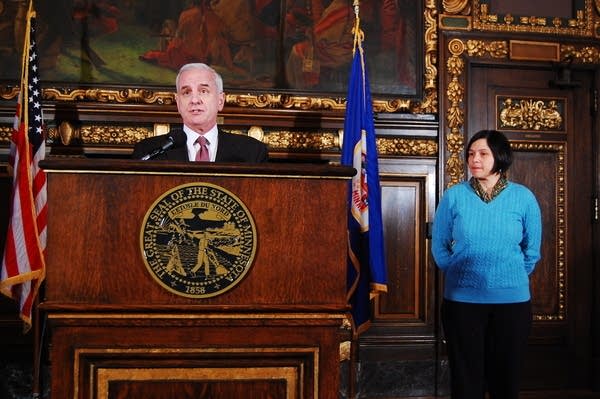Dayton: Budget proposal to increase school funding

Gov. Mark Dayton said Friday the budget he'll unveil in 11 days will meet a campaign promise to increase spending for schools.
But the governor would not reveal at the State Capitol press conference just how much that increase will be, or whether it will go beyond paying back loans the state borrowed from schools last year to balance the state's budget.
"I'm going to wait until February 15 to detail the specifics of that," Dayton said. "But it will be fulfilling my campaign promise to increase state funding for public K-12 education in the first two years, and my intent will be to continue to fulfill that promise every year I'm governor."
The promise of more education spending was part of a vision the governor outlined for education in his administration.
Create a More Connected Minnesota
MPR News is your trusted resource for the news you need. With your support, MPR News brings accessible, courageous journalism and authentic conversation to everyone - free of paywalls and barriers. Your gift makes a difference.
Dayton intends to create a new commission to study the way school money is distributed and recommend a different approach. Similar efforts have stalled in the past.
Among Dayton's goals:
- Enhance early childhood programs, implement school readiness standards and build off recent efforts to make all-day kindergarten more prevalent around the state.
- Narrow Minnesota's nagging achievement gap between white students and those from other ethnic backgrounds, although Education Commissioner Brenda Cassellius said a measurable goal would come later.
- Align state tests so they better measure year-to-year academic growth by individual students instead of assessing progress by grade level, such as this year's fifth-graders against their predecessors.
- Set accountability targets around a goal of making sure students are reading well by third grade.
Some of his ideas will require legislative authorization and others would need sign off from the federal government.
Cassellius said she wants to be evaluated on how much the state's achievement gap closes during her tenure, along with how many more children are ready for kindergarten and are able read by third grade.
"There's been a law on the books since 2001, stating that all children should be able to read by third grade. We're going to put some guts to that and really hold ourselves accountable to ensuring that all children can learn," she said.
Testing requirements are now largely guided by the federal No Child Left Behind law, which is up for reauthorization. Some states are pushing for more flexibility in how the tests are used to hold schools accountable.
"Tests now are so dominant and so frequent that they are skewing teaching so teachers are spending weeks and months teaching to a test especially in the early grades rather than teaching a love of learning," Dayton said.
The proposal drew a mixed response, with education advocacy groups issuing statements of support and Republican leaders giving either tepid or critical reaction.
"I see nothing new here. Invest means to spend more. I see nothing about parents in this seven-point plan, not a thing about empowering parents," said House Education Reform Committee Chairwoman Sondra Erickson, R-Princeton. "Parents are our first teachers of students."
Deputy Senate Majority Leader Geoff Michel, R-Edina, said he thinks the financial boost to schools could be tough to pull off given Minnesota's battered budget.
"It just seems difficult to add a lot of money in one part of the budget without knowing where his cuts and reforms are," Michel said.
All sides said they were working toward a compromise on legislation making entry into the teaching profession easier for those who don't meet traditional state licensing requirements. It would allow the state to issue provisional teacher licenses to people with certain qualifications.
